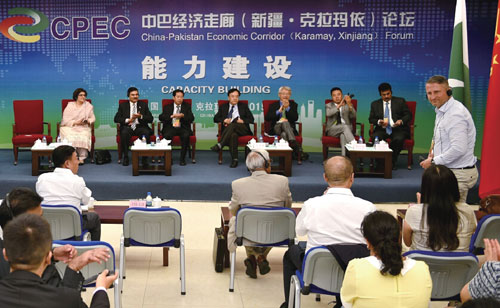Economic corridor benefits not just China and Pakistan
Updated: 2016-05-18 08:06
By Khalid Rahman(China Daily)
|
||||||||
 |
|
A foreign guest greets participants at the Capacity Building Sub-forum of the China Pakistan Economic Corridor (Karamay, Xinjiang) Forum on Aug 11, 2015. [Photo by Zhang Zhaogeng/ Karamay Daily] |
The idea for a China-Pakistan Economic Corridor would not have seen the light of the day if the two countries did not share the trust needed for such a long-term, multi-dimensional mega-project.
While the initiative was announced in 2015, its foundations were laid as early as the 1960s with the "air corridor", "The Karakoram Highway", and later the construction of Gwadar Port.
Apparently an energy and economic corridor, it is in fact a framework for holistic development. It puts equal emphasis on social sectors and would kick off a process which would have a far-reaching impact on the development of the whole region and the world at large. The significance of the CPEC can be imagined as it is a key link in China's Belt and Road Initiative, which involve 4.4 billion people across 65 countries on three continents.
While the Belt and Road Initiative, the Silk Road Economic Belt and 21st Century Maritime Silk Road, is a pivotal strategy for China, President Xi Jinping's vision is not confined to creating a trade route, but a community of "shared interests, fate, and responsibilities". This vision is based on the understanding that technological developments can only be fully exploited when the physical infrastructure for transporting people, goods and services are in place, fully developed and supported by friendly policies, legislation and procedures with a win-win approach. Areas along the CPEC would have the potential to become a trade, transit, transport and economic and energy hub for regional progress and development as well.
Once the project was announced, the first task, at the operational level was to develop a consensus on what the CPEC would involve and its various components, such as the mechanisms for regular consultations, the cooperation modes and how it would be financed. Likewise for specific projects, as they were identified and agreed. Measures to address the volatile security situation have also been a priority on the agenda.
Looking back on the project's first year, one finds that not only a deep understanding on essential issues has been reached, a lot of development on the ground has also commenced. It is expected that the Early Harvest plans will be completed in the stipulated timeframe; that is by March 2018.
As to the security aspect, a Special Security Division has been established in Pakistan for the CPEC. It is already operational and thousands of security personnel have been deployed in various parts of the country along with CPEC projects.
However, a pertinent question often raised in light of the political and diplomatic landscape of the region is with so much bilateral, regional and global significance attached to the project, will it not face any counter-moves by adversaries of the two countries? While the answer may not be difficult to perceive, the strategy in this regard primarily revolves around developing stakeholders of all concerned in the project.
At the same time as progress has been made on the ground, the interest and attention being given to CPEC at the highest level by the two countries' leaderships ensure that effective and timely notice will be taken to counter all negative moves. Indeed, the strong level of trust between the two countries, that has remained the key factor in their relationship over the last six decades, will be further enhanced with the CPEC. It will take the relationship to new heights in the coming decades and spread benefits to South, Central and West Asia as well.
The author is director general of the Institute of Policy Studies in Islamabad.
- Pakistan guests study in Karamay
- Biggest China-Pakistan Economic Corridor infrastructure project begins construction
- AIIB sets up co-financing road project in Pakistan
- One Belt, One Road win-win for China, Pakistan
- China, Pakistan to launch joint air drill
- Karakoram Highway: Path to riches for China, Pakistan
- China, Pakistan to facilitate pragmatic cooperation of OBOR
- Special troops to help keep China-Pakistan corridor safe
- Global health entering new era: WHO chief
- Brazil's planning minister steps aside after recordings revelation
- Vietnam, US adopt joint statement on advancing comprehensive partnership
- European border closures 'inhumane': UN refugee agency
- Japan's foreign minister calls A-bombings extremely regrettable
- Fukushima impact unprecedented for oceans: US expert

 Stars of Lijiang River: Elderly brothers with white beards
Stars of Lijiang River: Elderly brothers with white beards
 Wealthy Chinese children paying money to learn British manners
Wealthy Chinese children paying money to learn British manners
 Military-style wedding: Fighter jets, grooms in dashing uniforms
Military-style wedding: Fighter jets, grooms in dashing uniforms
 Striking photos around the world: May 16 - May 22
Striking photos around the world: May 16 - May 22
 Robots help elderly in nursing home in east China
Robots help elderly in nursing home in east China
 Hanging in the air: Chongqing holds rescue drill
Hanging in the air: Chongqing holds rescue drill
 2.1-ton tofu finishes in two hours in central China
2.1-ton tofu finishes in two hours in central China
 Six things you may not know about Grain Buds
Six things you may not know about Grain Buds
Most Viewed
Editor's Picks

|

|

|

|

|

|
Today's Top News
Liang avoids jail in shooting death
China's finance minister addresses ratings downgrade
Duke alumni visit Chinese Embassy
Marriott unlikely to top Anbang offer for Starwood: Observers
Chinese biopharma debuts on Nasdaq
What ends Jeb Bush's White House hopes
Investigation for Nicolas's campaign
Will US-ASEAN meeting be good for region?
US Weekly

|

|







